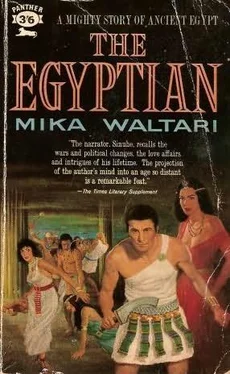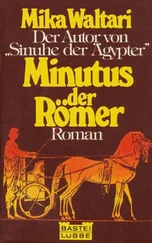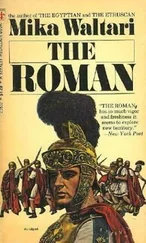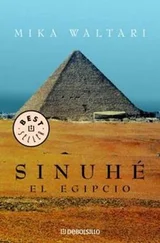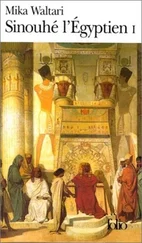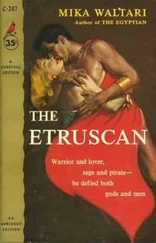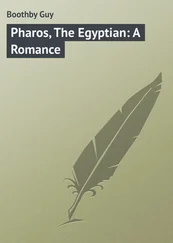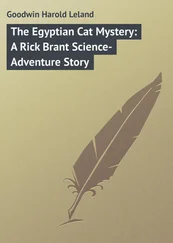Mika Waltari - The Egyptian
Здесь есть возможность читать онлайн «Mika Waltari - The Egyptian» весь текст электронной книги совершенно бесплатно (целиком полную версию без сокращений). В некоторых случаях можно слушать аудио, скачать через торрент в формате fb2 и присутствует краткое содержание. Жанр: Исторические приключения, на английском языке. Описание произведения, (предисловие) а так же отзывы посетителей доступны на портале библиотеки ЛибКат.
- Название:The Egyptian
- Автор:
- Жанр:
- Год:неизвестен
- ISBN:нет данных
- Рейтинг книги:3 / 5. Голосов: 1
-
Избранное:Добавить в избранное
- Отзывы:
-
Ваша оценка:
- 60
- 1
- 2
- 3
- 4
- 5
The Egyptian: краткое содержание, описание и аннотация
Предлагаем к чтению аннотацию, описание, краткое содержание или предисловие (зависит от того, что написал сам автор книги «The Egyptian»). Если вы не нашли необходимую информацию о книге — напишите в комментариях, мы постараемся отыскать её.
The Egyptian — читать онлайн бесплатно полную книгу (весь текст) целиком
Ниже представлен текст книги, разбитый по страницам. Система сохранения места последней прочитанной страницы, позволяет с удобством читать онлайн бесплатно книгу «The Egyptian», без необходимости каждый раз заново искать на чём Вы остановились. Поставьте закладку, и сможете в любой момент перейти на страницу, на которой закончили чтение.
Интервал:
Закладка:
A miracle happened during my school days and happened so suddenly that I still remember that hour as one of revelation. It was a fair, cool day in spring when the air was full of bird song and storks were repairing their old nests on the roofs of the mud huts. The waters had gone down, and fresh green shoots were springing from the earth. In all the gardens seeds were being sown and plants bedded out. It was a day for adventure, and we could not sit still on Oneh’s rickety old veranda, where the mud bricks crumbled under one’s hand. I was scratching at those everlasting symbols-letters for cutting in stone and beside them the abbreviated signs used for writing on paper-when suddenly some forgotten word of Oneh’s, some queer flash within myself, spoke and brought these characters to life. The pictures became a word, the word a syllable, the syllable a letter. When I set picture to picture, new words leaped forth-living words, quite distinct from the symbols. Any yokel can understand one picture, but two together have meaning only for the literate. I believe that everyone who has studied writing and learned to read knows what I am trying to say. The experience was to me more exciting, more fascinating than snatching a pomegranate from a fruit seller’s basket-sweeter than a dried date, delicious as water to the thirsty.
From that time I needed no urging but soaked up Oneh’s learning as dry earth soaks up the flood waters of the Nile, and I quickly learned to write. In a little while I began to read what others had written, and by the third year I could already spell my way through tattered scrolls and read aloud instructive fables for the others to write down.
About this time I noticed that I did not look like the rest. My face was narrower, my skin lighter, and my limbs more slender than those of the other lads and of the people among whom I dwelt. But for the difference in dress, hardly anyone could have distinguished me from the boys who were carried in chairs or walked the streets attended by slaves. I was sneered at for this; the corn merchant’s son would try to put his arm round my neck and called me a girl until I had to jab him with my stylus. He revolted me for he had an evil smell, but I liked to be with Thothmes, who never touched me. One day Thothmes said shyly, “I will model your likeness if you will sit for me.”
I took him home, and there under the sycamore he made a likeness of me in clay and scratched the characters of my name upon it with a stylus. My mother Kipa, coming out with cakes for us, was badly frightened when she saw the image and called it witchcraft. But my father said that Thothmes might become artist to the royal household if he could only join the temple school, and jokingly I bowed down before Thothmes and stretched forth my hand at knee level as one does in the presence of distinguished persons. His eyes shone; then he sighed that it could never be, for his father thought it was time he came back to barracks and joined the school for charioteers. He could already write as well as was required of any future officer. My father left us then, and we heard Kipa muttering to herself in the kitchen; but Thothmes and I ate the cakes, which were greasy and good, and we were well content.
I was still happy then.
5
The day came when my father put on his newly washed best robe and set about his neck a broad collar embroidered by Kipa. He went to the great temple of Ammon, though privately he had no love for priests. But nothing ever happened in Thebes or indeed in the whole of Egypt at this time without their help and intervention. They administered justice so that a bold man against whom judgment had been given by Pharaoh’s own court could appeal to them for redress. In their hands lay all instruction for the higher administrative posts. They foretold the height of the flood waters and the size of the harvest and from this assessed the taxes for the whole country.
I do not think it can have been easy for my father to humble himself before them. All his life he had been a poor man’s physician in the poor man’s quarter-a stranger to the temple and the House of Life-and now like other penniless fathers he had to wait in line outside the administrative department until it should please some holiness or other to receive him. I can see these poor fathers now, squatting in the temple courtyard in their best robes, dreaming ambitious dreams for their sons, for whom they coveted a better existence than their own. Many of them had come a long way on river boats, carrying their food with them. They spent their substance on bribes to doorkeeper and clerk for the privilege of a word with a gold-embroidered, perfumed, and anointed priest, who wrinkled his nose at the smell of them and gave them harsh words. And yet-Ammon stands in continual need of new servants. The greater his wealth and power, the greater the numbers of scribes he wears out in his service. However, there is not a father who does not regard it as a divine favor for his son to be received into the temple-ay, though in bringing the boy he brings a gift more precious than gold.
My father was fortunate in his visit, for noon had scarcely passed when his old fellow student Ptahor came by. In the course of time Ptahor had become skull opener to Pharaoh’s household. My father ventured to address him, and he promised to honor our house in person and inspect me.
The day being fixed, my father saved up for a goose and the best wine. Kipa baked-and nagged. A luscious odor of goose fat floated out into the street till blind men and beggars gathered there to sing and play for their share of the feast. Kipa, hissing with rage, charged out with a bit of bread dipped in the fat for each of them and sent them packing. Thothmes and I swept the street from our door far into the city. My father had asked Thothmes to be at hand when the guest came, in the hope that he also might be favored with the great man’s attention. Boys though we were, when my father lit the censer and set it to perfume the entrance way, we felt as awestruck as if we had been in a temple. I guarded the can of scented water and kept the flies off the dazzling white linen cloth Kipa had set aside for her own burial, but which was now brought forth as a towel for Ptahor.
We had long to wait. The sun set, and the air grew cooler. The incense in the porch all burned away, and the goose sizzled sorrowfully in the roasting pit. I grew hungry, and Kipa’s face lengthened and stiffened. My father said nothing but would not light the lamps- when darkness fell. We all sat down on stools in the porch and avoided one another’s eyes, and it was then I learned what bitter grief and disappointment the rich and mighty in their thoughtlessness can bring upon the poor.
But at last there came the glow of a torch along the street. My father jumped up and hastened to the kitchen for an ember to light both the lamps. I raised the water pitcher in trembling hands while Thothmes breathed heavily beside me.
Ptahor, the opener of royal skulls, arrived unpretentiously in a chair borne by two Negro slaves and preceded by a fat torchbearer who was evidently drunk. With puffings and cheerful cries of greeting Ptahor stepped from the chair to hail my father, who bowed and stretched forth his hands at knee level. The guest laid his hands on Senmut’s shoulders, either to show him that ceremony was needless or to steady himself. Thus supported he kicked at the torchbearer and told him to sleep it off under the sycamore. The Negroes, without waiting for orders, dumped the chair in the acacia bushes and squatted on the ground.
Still leaning on my father’s shoulder, Ptahor stepped into the porch, where I poured water over his hands despite his protests. When I handed him the linen cloth, he said, that as I had rinsed his hands I might now dry them. When I had done this, he thanked me and said I was a handsome boy. My father led him to the seat of honor-a chair with a back, borrowed from the spice merchant-and he sat down, his inquisitive little eyes peering about him in the light of suet lamps. For a time there was silence. Then, clearing his throat apologetically, he asked for something to drink as the long journey had made him dry. My father, delighted, poured out wine for him.
Читать дальшеИнтервал:
Закладка:
Похожие книги на «The Egyptian»
Представляем Вашему вниманию похожие книги на «The Egyptian» списком для выбора. Мы отобрали схожую по названию и смыслу литературу в надежде предоставить читателям больше вариантов отыскать новые, интересные, ещё непрочитанные произведения.
Обсуждение, отзывы о книге «The Egyptian» и просто собственные мнения читателей. Оставьте ваши комментарии, напишите, что Вы думаете о произведении, его смысле или главных героях. Укажите что конкретно понравилось, а что нет, и почему Вы так считаете.
